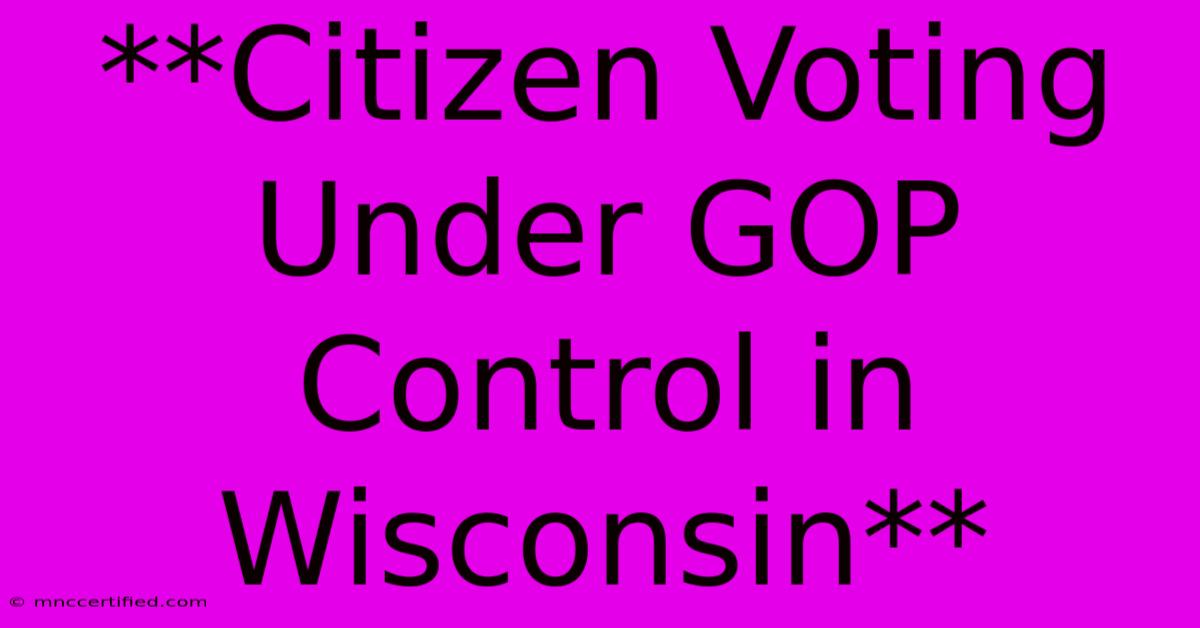**Citizen Voting Under GOP Control In Wisconsin**

Table of Contents
Citizen Voting Under GOP Control in Wisconsin: A Shifting Landscape
The political landscape of Wisconsin has experienced significant changes under the control of the Republican Party, particularly concerning voting rights and access. This has sparked heated debate and legal challenges, leaving many wondering about the future of citizen participation in elections.
A History of Voting Rights in Wisconsin
Wisconsin has historically been regarded as a state with strong voting rights and high voter turnout. However, the past decade has seen a shift in this narrative, with GOP-led initiatives impacting the voting process and raising concerns about potential voter suppression.
Key Changes Under GOP Control:
1. Voter ID Laws: One of the most controversial changes was the implementation of a strict voter ID law. Critics argue that it disproportionately affects marginalized communities who may lack readily available forms of identification, creating a barrier to voting. Supporters claim it strengthens election integrity by preventing voter fraud, though there is minimal evidence to support this claim.
2. Reduced Early Voting: GOP-backed legislation significantly reduced the window for early voting, making it more challenging for individuals with busy schedules or limited access to polling places on Election Day. This move has been criticized for disenfranchising voters, especially those in urban areas and minority groups.
3. Restrictions on Absentee Voting: There have been attempts to restrict absentee voting, a crucial option for many voters, including those with disabilities or those who live overseas. These restrictions make it more difficult to cast a ballot by mail, raising concerns about accessibility and voter convenience.
4. Redistricting: The GOP has also played a significant role in redistricting, the process of redrawing electoral districts. This process has been accused of partisan gerrymandering, which aims to favor one party over another by manipulating district boundaries.
Challenges and Controversy:
These changes have faced legal challenges and criticism from advocates who argue that they disenfranchise voters and undermine the democratic process. The debate centers around the balance between election security and voter access, with both sides arguing their perspectives.
The Future of Voting Rights:
The future of voting rights in Wisconsin remains uncertain. The ongoing legal battles and public discourse highlight the importance of ensuring fair and accessible elections for all citizens. The impact of these changes on voter turnout and participation is still unfolding, and its long-term consequences remain to be seen.
Conclusion:
The political landscape of Wisconsin has undoubtedly been shaped by GOP-led initiatives affecting voting rights and access. Understanding these changes is crucial for understanding the evolving dynamics of civic participation and the potential impact on the democratic process.
It is vital for citizens to stay informed about these developments, engage in open dialogue, and advocate for policies that ensure a fair and equitable electoral system for all.

Thank you for visiting our website wich cover about **Citizen Voting Under GOP Control In Wisconsin**. We hope the information provided has been useful to you. Feel free to contact us if you have any questions or need further assistance. See you next time and dont miss to bookmark.
Featured Posts
-
Bitcoin Price Could Trumps Win Drive Growth
Nov 07, 2024
-
Crime Laws Ballot Box Victories
Nov 07, 2024
-
Daniel Barlow Height Taller Than Take That
Nov 07, 2024
-
5 Things Ex Presidents Cant Do
Nov 07, 2024
-
Carolina Casualty Insurance Company Claims
Nov 07, 2024